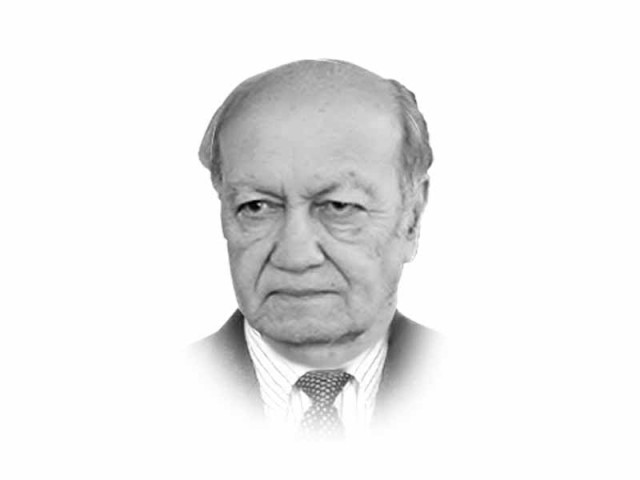Breaking the political gridlock
Pakistan government’s decision to attend the “Heart of Asia” conference was not easy

The writer is a retired lieutenant general of the Pakistan Army and a former federal secretary. He has also served as chairman of the Pakistan Ordnance Factories Board

Paradoxically, when Pakistan strengthens border management to prevent illegal crossings, drug trafficking and to demonstrate its commitment that its territory will not be used against any country Afghanistan views it as though it is a ruse to sidetrack the issue of Durand Line. A more realistic response should have been for Kabul to fortify its own side of the border. With this indifference and a deliberate inimical policy, Afghanistan and India could inhibit Pakistan’s efforts to take strong measures against Taliban and other regional militant organisations. Pakistan cannot afford to invite their hostility and add to its woes when India and Afghan governments continue to undermine its efforts of promoting peace. By giving protection and patronage to TTP and other Pakistan specific militant groups Afghan security establishment is playing in the hands of India. Clearly, terrorism is a global scourge and not any one country’s problem and most effective way of countering it is cooperation between the countries and not confrontation.
It is becoming clear that Modi by constantly targeting Pakistan is trying to shift focus from the current insurgency in Kashmir. India is taking full advantage of the indifference of major powers and committing gross human rights violations in Kashmir. Forthcoming elections in Uttar Pradesh, the most populous state, where Modi has not much to show is another factor to drum up anti-Pakistan tirade. India is also wary of Pakistan’s expanding and deepening relationship with China.
As regards Afghanistan’s leadership it scapegoats Pakistan for its own failures. President Ghani should realise that blame game is no policy and only pushes the country in a cul-de-sac. This is not to say that Pakistan’s policies have been fault free. We have to ensure that none of the remnants of Afghan Taliban leadership and Haqqani network operate or remain in Pakistan. The challenge is for all the regional countries and especially the immediate neighbours of Afghanistan to bring synergy and a minimum level of convergence to stabilise Afghanistan.
Fortunately, Islamabad’s relations with Iran are improving and there is a greater level of cooperation. Recent offer of Iran’s foreign minister that it could play a conciliatory role between India and Pakistan, even if it has an emblematic value is a good sign. With President elect Donald Trump Tehran is apprehensive of its future relations with US and is focusing on strengthening bilateral and regional cooperation. In the last few years a major realignment of international forces is taking place where China and Russia are getting closer to countervail US proximity with India and Japan. The main thrust of US being to checkmate China at the regional level.
India’s recent move to develop an air corridor to Afghanistan is a part of its broader strategy to bypass and isolate Pakistan. But if it is under the impression that Afghanistan can sidetrack Pakistan it is sadly mistaken. Firstly, airlift will increase the cost of products and there are limits to the number of flights that are needed to meet the demands of Afghanistan. Airlift can supplement but cannot be a substitute for the land route for imports and exports.
This brings me to the perennial question that when would it be a good move to grant MFN status and also transit rights both ways to move cargo between Afghanistan and India. Will it influence Indian and Afghan government’s behaviour and initiate a process whereby trade and commerce could lead to building bridges to counter the ingrained hostility. Our establishment has taken a position that it is not the appropriate time especially when India remains so hostile. There is merit in that but nothing on the horizon seems to suggest that the situation is likely to alter in the foreseeable future. Nonetheless, we need to do a more detailed analysis of its pros and cons. Pakistan’s geography provides an invaluable advantage. Pakistan and China are going to benefit enormously as the CPEC project matures over the years. Opening the India-Afghanistan route will further actualise Pakistan’s geographic and strategic potential. The Chinese taking a long-term view of their national interests are developing three corridors going to important regions of the world. The Belt and Road conceptual framework visualises one passing through Central and West Asia and the other to Europe. Regional countries of South Asia need to learn from European and now Chinese experience, as we are the least integrated regions. Regrettably, India despite its size, resources and population conducts its relations with its immediate neighbours as a bully reflecting either a sense of false pride or insecurity.
As it is unlikely that Pakistan will be willing to grant India the MFN status or open its borders for free trade in the near future the two countries could trade certain specific items and gradually keep expanding the list. This is how the European countries having major political differences started their economic interaction much before the creation of European Union. This combined with a more relaxed visa regime for ordinary tourists and businessmen should contribute in easing tensions.
Published in The Express Tribune, December 7th, 2016.
Like Opinion & Editorial on Facebook, follow @ETOpEd on Twitter to receive all updates on all our daily pieces.
















COMMENTS
Comments are moderated and generally will be posted if they are on-topic and not abusive.
For more information, please see our Comments FAQ